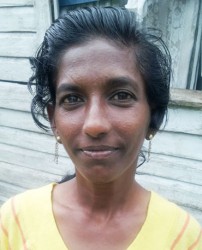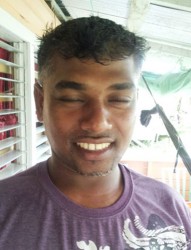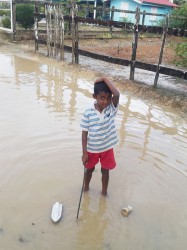Story and photos by Tifaine Rutherford
Situated on the East Bank of Essequibo, Naamless stretches for about a ¼ of a mile and is home to approximately 150 residents of Indian and Amerindian descent. The name of the settlement appears to be a combination of Dutch and English words: ‘Naam’ meaning ‘name’ in Dutch, and the English ‘less’ ‒ hence ‘Nameless.’
Naamless is a very small riverine community which lies between Lacaboo and Bendorff. Many people may not have heard about this village, but residents living here say that is not a problem to them as they love their quiet and serene community.
Most of the residents in Naamless are involved in agricultural activities and cash crop farming, although there are some who are employed as taxi-drivers and in the public sector. “Everyone does some sort of farming in here; if is not cash crop is provisions they farming,” a resident said.
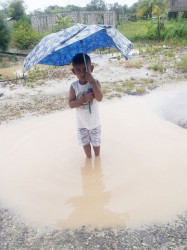
Taxi-driver Deonauth Deodat was on his way to work when Sunday Stabroek caught up with him at his home. Deodat said that he and his wife decided to make Naamless their home two years ago after moving from another village further down the backdam. He said that since he moved, there has been constant flooding whenever there is heavy rainfall or spring tides. “Since I move in here soon as rain fall it does be pure flooding. It does be so much flooding that them people next door does gotta use boat in they yard to get around.”
He said that because the Essequibo River is at the back of the village they were promised that sea defences would be built to alleviate the problem, but nothing has been done and as a consequence the village suffers greatly.
One of the issues that all of the residents agreed were affecting them directly was the state of the road. The main access road into the village is riddled with potholes, most of an impressive size, and residents complained that if there is an emergency in the village they would not be able to get out in time. “Is one road in and one road out. This road terrible, if something bad was to happen in here then it would take forever to get out of here. Something needs to be done about this road. Since I living here this road never good, and that was donkey years we talking about,” a resident said.
Deodat who uses the road on a daily basis said that it takes nearly half an hour to get to Parika when the road is bad, “but when the road lil good it will take me like ten minutes.”
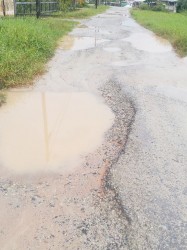
The village is devoid of a post office, police outpost, health centre and community centre. This is almost certainly because the population is so small.
The nearest health centre is located at Parika, while there is one health worker at the Hubu koker. Several residents complained that if anything serious were to happen, it would take a while to get to the Leonora Cottage Hospital.
There are buildings for all the different religions and this was seen as a plus for a village as small as Naamless. “Although we village small we get mandir, temple and church so no one does feel left out,” a resident said proudly.
School-age children attend the St Lawrence Primary school which is located less than half a mile away, while the older children attend various secondary schools in Parika. There are three small shops in the
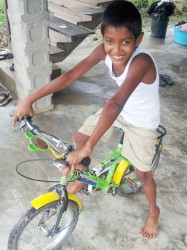
community that supply the residents with some of their basic needs. For recreation, the children and several adults in the community would trek to the community centre ground at the Glen Eagles Sports Club for the occasional game of cricket.
The residents here said that crime was not prevalent, not even occasional petty theft. “This village don’t get crime. I never hear about anybody get rob or anything like that in here. This is a small and peaceful village.”
In giving some history of the village, Basmattie Harry who has been residing in Naamless for the past 25 years said that when she first moved to the community it was a quiet place. “There were not a lot of homes in the village. It was a lonely and quiet place. There was no light, no water and the roads were really bad. This is na nothing now. Long ago the road was really terrible.”
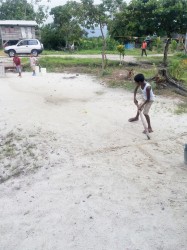
Harry said that one of the biggest problems in the village was the lack of public transportation, especially on Saturdays. “One bus does work in here and they does charge $100 per head. A hire car does also work in here too. On Saturdays it does be really hard to get out of here ’cause the bus doesn’t work sometimes.”
Notwithstanding several of the issues the community is facing, all of the residents said that they like the peace, have all the basic necessities and wouldn’t want to leave.
